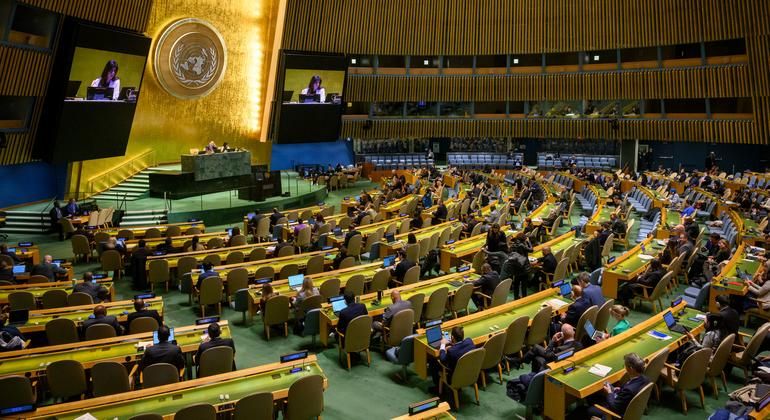The text, introduced by Russia and adopted without a vote, “welcomes the efforts of the Secretary‑General to strengthen the United Nations in order to keep pace with a changing world” and calls on UN entities and specialised agencies to align their reform efforts “as appropriate”.
In the resolution, the 193-member Assembly “recognises the central role of Member States in the reform process, which should be inclusive and transparent”.
It also “looks forward to receiving, in accordance with established procedures” the Secretary‑General’s proposals under the initiative, “taking into account the necessity to have clearly defined objectives and an evidence-based approach, and aiming at strengthening the impact of the United Nations and enhancing its agility, responsiveness and resilience while addressing the issue of duplicative efforts and ensuring effective and efficient mandate delivery across all three pillars of the work of the United Nations.”
Launched by the Secretary-General in March, the UN80 Initiative centres on three priorities: enhancing operational efficiency, assessing how mandates – or key tasks – from Member States are implemented and exploring structural reforms across the UN system.
Mixed reactions on timing
Several delegations voiced backing for the reform effort, but questioned the timing of the resolution.
Speaking for the European Union, Denmark said the process was “premature and unnecessarily rushed”, noting that limited time for consultations “did not allow for the constructive engagement such an initiative requires”.
Australia, on behalf of the CANZ group (Canada, Australia and New Zealand), echoed that view, warning that an early resolution “risks limiting both the scope and ambition of the forthcoming proposals”.
Switzerland, speaking for a group including Iceland, Norway and Liechtenstein, also stressed that reform should be “ambitious and strategic”, building on existing assets while ensuring long‑term efficiencies.
Japan emphasised its “commitment to multilateralism” and said the initiative responds to the urgency of revitalising the UN.
“The success of the UN80 initiative relies on our shared and complementary responsibilities,” its delegate said.
Member States in the driving seat
Exercising its right of reply, Russia rejected claims that the text was rushed, saying it had “conducted several rounds of consultations” and “took into account the red lines specified by delegations, which came out in the silence procedure”.
The silence procedure sets out a window of time for delegations to express objections to a draft resolution or decision before it is formally acted upon.
The Russian delegate said the resolution puts Member States “into the driving force of this process” while recognising the Secretary‑General’s prerogative as chief administrative officer under the UN Charter.
“We seek success in the UN’s adaptation to current and future challenges,” the Russian delegate said, calling the resolution’s adoption “a very important step” to ensure universal support for the initiative.




